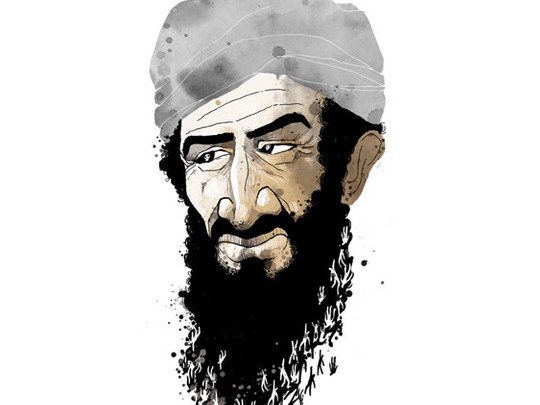
The killing of Osama Bin Laden, proclaimed by the US government as the ‘most wanted man in the world' has finally closed the chapter on a long journey spanning over a decade, and a game of hide and seek.
It ended yesterday morning when most of the region woke up to the announcement by US President Barack Obama that the elusive Bin Laden had been killed in a gun battle following an intensive covert operation involving US Special Forces and their Pakistani counterparts.
According to preliminary reports, US Navy Seals launched a helicopter raid on a compound in the town of Abbottabad, about 100 km north of the capital Islamabad killing Bin Laden, his son and two other men. A woman was also killed.
Following his quick burial at sea, questions may arise in the minds of many whether the ideology that this furtive figure helped shape would be threatened and doomed to extinction now that the leader is dead.
But in a Middle East that has been witnessing unprecedented changes in recent months through non-violent popular movements, would the death of Bin Laden figure as more than one of those breaking news stories of the hour? Most people in the Arab world had long rejected Bin Laden and his ideology, which promoted the killing of the innocent.
Following a series of bombings by Al Qaida around the world and in Saudi Arabia — like the May 12 and November 8, 2003, attacks on residential compounds which killed 26 and 17 people respectively, the May 1, 2004 attack in Yanbu that left 7 civilians dead and the May 29, 2004 massacre in Al Khobar which killed more than 20 — public opinion against Bin Laden and his group hardened and he was declared ‘persona non grata'.
It became quite apparent that Bin Laden's ideology did not conform to the teachings of Islam, and was in fact a contradiction to the message of peace.
Al Qaida was not the beacon to draw the masses as was hoped for by its leadership. Instead the organisation attracted the misfits and oddballs who filled its ranks, manipulated and guided by CIA-trained Al Qaida operatives and fuelled by a twisted interpretation of jihad. Bin Laden's death was expected by many to be much sooner and in that it took almost a decade, since September 11 was put down to the incompetence of the US intelligence services.
Actions shaping across the Middle East today almost make his killing a non-significant event, as the masses are preoccupied in several of these countries with the game of continued existence and change. It is apparent that the non-violent way in which many took to the streets to press for more freedom is in direct contrast to the violent methods employed by Al Qaida, and this departure could well signal the end for this terrorist group, given the death of its leader.
Sign of relief
Events in Libya, Syria, Algeria, Yemen and Bahrain today are more important for those facing the challenges within those borders than the death of a man considered to be the icon of terror in the 21st century. Palestinians have the brutality of the Israeli occupation to contend with. Regionally, increased tensions between the GCC countries and Iran will not allow more than a passing interest in the news that Osama Bin Laden is dead. He was no longer considered relevant.
There may be pockets of individuals who may take his death to heart and suffer in silence, but for most people the news has come as a sign of relief that the flame has been extinguished. I would venture to speculate that the interest of most people following the news of his death would be similar to one shown by those following the recent royal wedding in London. Seen that, done that — now let's move on to matters on our plates. A topic that will occupy social conversation in office and dinner circles; it would remain just that for a few weeks. It would be naive to expect however that terrorist activity would plummet dramatically in the coming months, as ideologies do not die as quickly as humans.
One person on giving his reaction to the news said, "In my personal opinion, Bin Laden was an evil-minded person who, by his ill-advised terrorist acts, brought shame and dishonour to [the] entire Muslim [community]. He tarnished the image of our great religion Islam, which teaches peace and coexistence. He and his associates, by their terrorist acts, did not serve any purpose except that they provided the golden opportunity to everybody to unjustly target Muslims, Islam and our beloved Prophet Mohammad (PBUH)."
Another added, "Muslims in general are peace-loving and Islam is a peaceful religion. However, only because of him and his associates, Muslims of all nationalities suffered in many ways, including [through] suspicion, mistrust and even humiliations, in western countries, especially in the United States. Muslim students, travellers and even Muslim nationals suffered in these western countries because of his actions." Many expect, and with conviction, that with Osama Bin Laden now gone, the honour, respect and trust of Muslims throughout the world would be slowly restored and Islam would be redeemed. Only time will tell.
Tariq A. Al Maeena is a Saudi socio-political commentator. He lives in Jeddah, Saudi Arabia.












